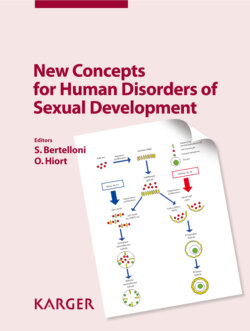Читать книгу New Concepts for Human Disorders of Sexual Development - Группа авторов - Страница 9
На сайте Литреса книга снята с продажи.
Abstract
ОглавлениеDisorders of sex development (DSD) are a rare group of conditions which require further research. Effective research into understanding the aetiology, as well as long-term outcome of these rare conditions, requires multicentre collaboration often across national boundaries. The EU-funded EuroDSD programme (www.eurodsd.eu) is one such collaboration involving clinical centres and clinical and genetic experts across Europe. At the heart of the EuroDSD collaboration is a European DSD registry and a targeted virtual research environment (VRE) that supports the sharing of DSD data. Security, ethics and information governance are cornerstones of this infrastructure. This paper describes the infrastructure that has been developed, the inherent challenges in security, availability and dependability that must be overcome for the enterprise to succeed and provides a sample of the data that are stored in the registry along with a summary analysis of the current data sets.
Copyright © 2010 S. Karger AG, Basel
Suspected cases of a disorder of sex development (DSD) are usually present in early infancy with a variable abnormality of the development of the external and/or internal reproductive organs. There is a large amount of variation in how these patients are managed across the world. In addition, there are enormous gaps in our knowledge about the aetiology of these conditions and the long-term outcome in affected adults. The management of these patients requires multidisciplinary input, and, increasingly, this service is being delivered through organised clinical networks which rely on research as a means of auditing and improving their service.
The Consensus Workshop on DSD which was jointly hosted by the European Society of Paediatric Endocrinology (ESPE) and the Lawson Wilkins Pediatric Endocrine Society of North America stressed the need for the creation and maintenance of a database in centres of expertise [Hughes et al., 2006]. Such databases do exist in many regional and national centres and have provided valuable insight into many aspects of DSD, including epidemiology [Ahmed et al., 2004], aetiology [Ahmed et al., 2000a; Gottlieb et al., 2004], variation of disease expression [Bebermeier et al., 2006], initial adjustment of parents to their affected child’s condition [Duguid et al., 2007], and long-term outcome [Lux et al., 2009]. However, these databases and registers lack international uniformity and have not been integrated - a key feature particularly desirable when dealing with a rare group of conditions. With the initial help of ESPE and, more recently, from the European Union, a European web-based register and research environment for DSD has now been in operation for approximately 2 years. This infrastructure is currently helping the EuroDSD programme (www.eurodsd.com) and has the potential to address many unanswered questions in the future.
Fig. 1. The central role of the European DSD registry as the platform used for exchange of all information between the clinical and research partners with targeted tools supporting a VRE. Clinical partners enter data into the registry. Research partners subsequently design studies, assign recruitment criteria and search the registry for suitable cases. Research partners contact clinical partners for further details of positive cases, perform studies and enter data into the VRE so that new studies can be designed and knowledge promulgated.
This paper describes the construction of the current EuroDSD registry, the operating procedures, general description of the data that are held within the registry, and the future direction of the registry as it develops into a complete virtual research environment (VRE) for research into DSD.
